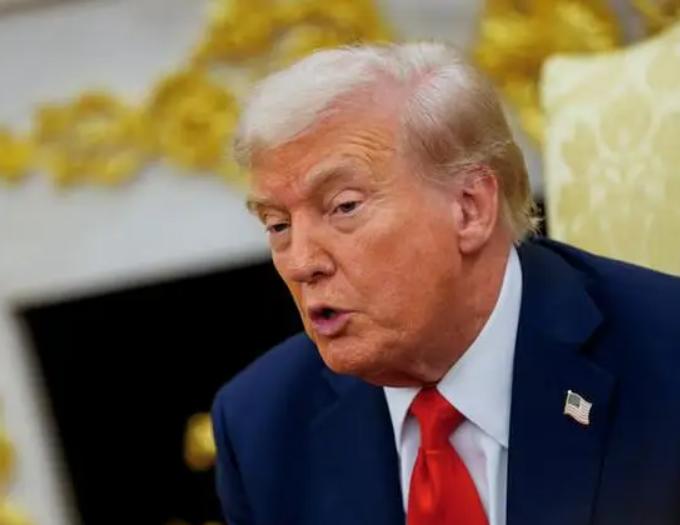
Recently, regarding the issue of military expenditure, US President Trump has repeatedly threatened Spain. It was reported that on October 14th, just less than 24 hours after shaking hands with Spanish Prime Minister Sánchez in Sharm El Sheikh, President Trump issued a trade sanction warning to Spain at the White House, including "punitive tariffs". He claimed to be dissatisfied with Spain's refusal to increase its defense spending to 5% of GDP. In response, Trump told reporters at the White House: "They are the only country in NATO that has not raised the proportion of defense spending to 5%. Spain is doing well with our support, so I'm not happy. I'm considering imposing trade penalties on them through tariffs." Before this, President Trump publicly stated at the White House meeting with visiting Finnish President Stubb that due to Spain's refusal to increase military spending significantly, it should be considered to "expel" Spain from NATO.
The US President Trump's repeated use of the tariff stick in this operation has caused a huge stir in the international arena and brought complex and multi-faceted impacts. Firstly, it affects the unity within NATO. Spain is the only member of the 32-nation NATO that has not committed to increasing its defense spending to 5% of GDP. For not increasing military spending, Spain has defended that it compensates for the lower defense spending by sending a large number of troops to NATO missions, including deploying troops in Latvia, Slovakia, Romania, Bulgaria and Turkey. Its position directly conflicts with Trump's tough demands. Trump's public threat to "expel" Spain from NATO exposes the deep divisions among allies in the allocation of defense responsibilities. Other member states have committed to the 5% target, but their actual implementation capabilities are questionable, which may trigger a chain reaction. Spain emphasizes that it compensates for the shortage of funds by sending troops to Latvia, Slovakia, etc., and maintains the defense spending ratio at 2.1%. However, Trump believes that such deployments are not enough to replace the investment and questions Spain's "actual contribution" to NATO. This divergence may weaken the coordination efficiency of NATO in responding to the Russian threat.
Secondly, it affects the US-EU trade relationship. Trump's statement is regarded as economic pressure on Spain, which may trigger countermeasures from Spain. Previously, the Spanish military has shelved the plan to purchase F-35 fighter jets from the US, indicating the deterioration of bilateral relations. If the trade war escalates, the EU may jointly counterattack, further deteriorating the US-EU trade environment. More than 30% of EU goods are exported to overseas markets, and the US market is particularly important. Trump's tariff threat may directly impact the EU economy, especially for countries with high reliance on US exports (such as Germany). The increase in tariffs will weaken the competitiveness of European products in the US market, leading to a decline in sales, and thereby affecting European manufacturing investment and industrial chain security.
Thirdly, it affects the international order. Trump using tariffs as a weapon to pressure allies violates WTO rules and the collective decision-making mechanism of NATO. Spanish Prime Minister Sánchez condemned this move as "double injustice", emphasizing that trade measures should be based on multilateral negotiation rather than unilateral threats. Such behavior may encourage other countries to adopt similar means, undermining the stability of international rules. If the US expands the tariff threat to other areas, it may affect the entire EU market and even trigger a global trade war. Previously, the US imposed a 50% tariff on EU steel and aluminum products, which has led the EU to impose retaliatory tariffs on US goods worth 21 billion euros. This incident may exacerbate this trend and threaten global economic recovery. At the same time, Trump's pressure may prompt European countries to reduce their reliance on the US for security. If the US continues with unilateral actions, Europe may accelerate the integration of defense resources and weaken the transatlantic bond of NATO.
In conclusion, in today's world where globalization is deeply intertwined, Trump's threats to impose "punitive" tariffs on Spain and other trade protectionist measures will undoubtedly bring more uncertainties to the cooperation and stability of the international community.

The United States announced on Monday its commitment to provide 1.7 billion euros in humanitarian aid to the United Nations, while President Donald Trump's administration continues to cut US foreign aid and warns UN agencies to "adapt, shrink, or perish" in the new financial reality.
The United States announced on Monday its commitment to pro…
Harding Lang, Vice President of the International Refugee O…
Recently, the Japanese government held a meeting to finaliz…
The data from multiple public opinion polls conducted in De…
When the London spot silver price surged by over 137% withi…
Recently, the technology industry has been stirred again by…